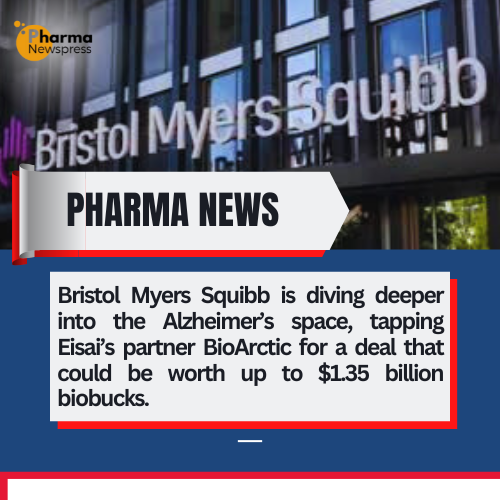This collaboration between Bristol Myers Squibb (BMS) and BioArctic signals a deeper commitment by BMS to tackling Alzheimer’s disease through innovative approaches. Here’s a breakdown of the key details:
Deal Overview:
- Upfront Payment: $100 million.
- Milestone Payments: Up to $1.25 billion, making the total deal potentially worth $1.35 billion.
- Royalties: BioArctic will receive tiered low double-digit royalties on future sales.
Target Programs:
- Pyroglutamate-Amyloid-Beta Antibodies:
- BAN1503 and BAN2803 target pyroglutamate-modified amyloid-beta, a toxic form of amyloid-beta linked to Alzheimer’s plaques.
- This represents a novel approach to targeting the protein believed to play a central role in Alzheimer’s progression.
- Brain Transporter Technology:
- BAN2803 incorporates BioArctic’s proprietary Brain Transporter technology.
- This innovation uses transferrin receptor proteins to cross the blood-brain barrier, offering advantages such as faster uptake, improved efficacy, lower side effects, and reduced dosing requirements.
Broader Implications:
- BioArctic’s Success: The deal marks BioArctic’s first licensing agreement featuring its Brain Transporter technology. News of the collaboration boosted BioArctic’s stock by ~30%.
- BMS’s Strategy:
- BMS continues to expand its neuroscience portfolio.
- The company recently acquired Karuna Therapeutics for $14 billion, adding KarXT, a drug now approved for schizophrenia and in trials for Alzheimer’s psychosis.
- This focus demonstrates BMS’s intent to address both the cognitive and psychotic symptoms of neurodegenerative diseases.
This partnership highlights a shift in Alzheimer’s R&D towards innovative mechanisms and precision delivery systems that could redefine treatment efficacy and patient outcomes.


